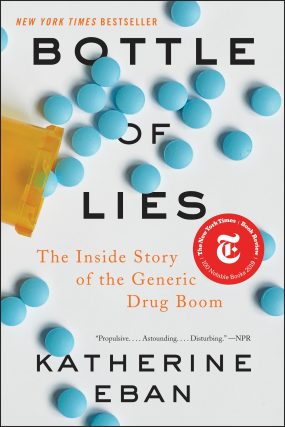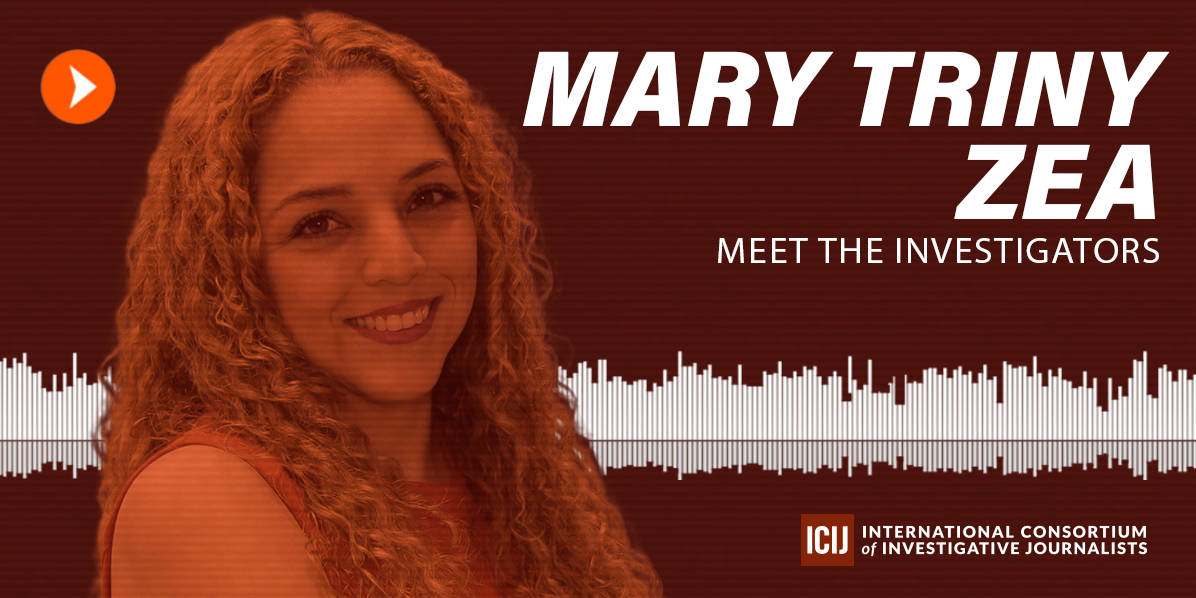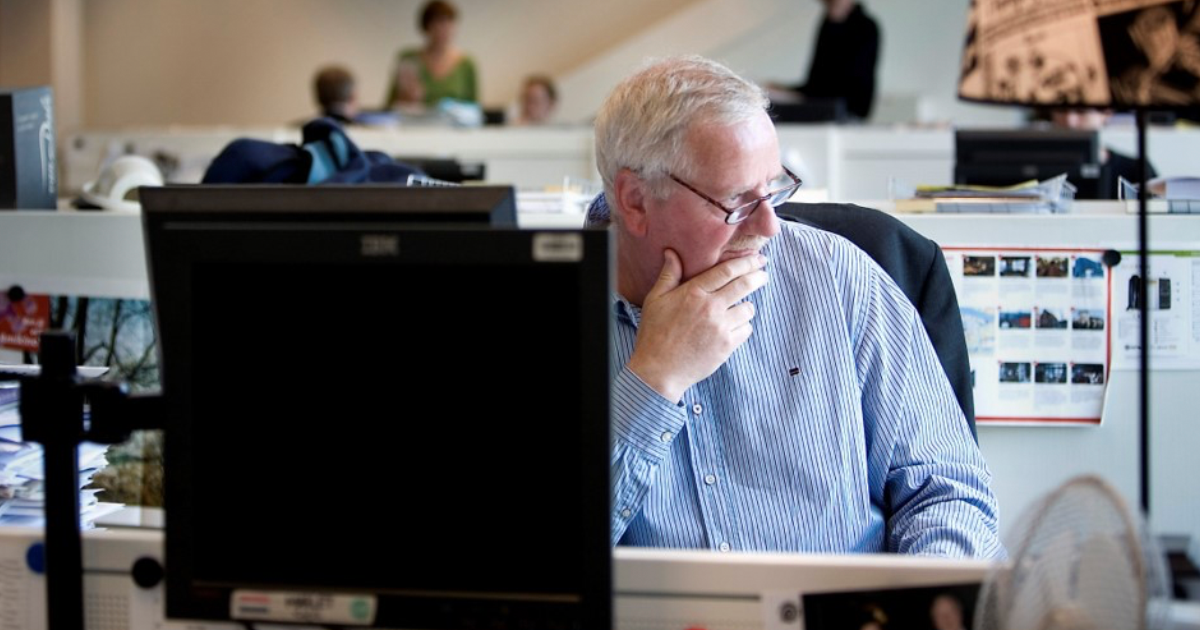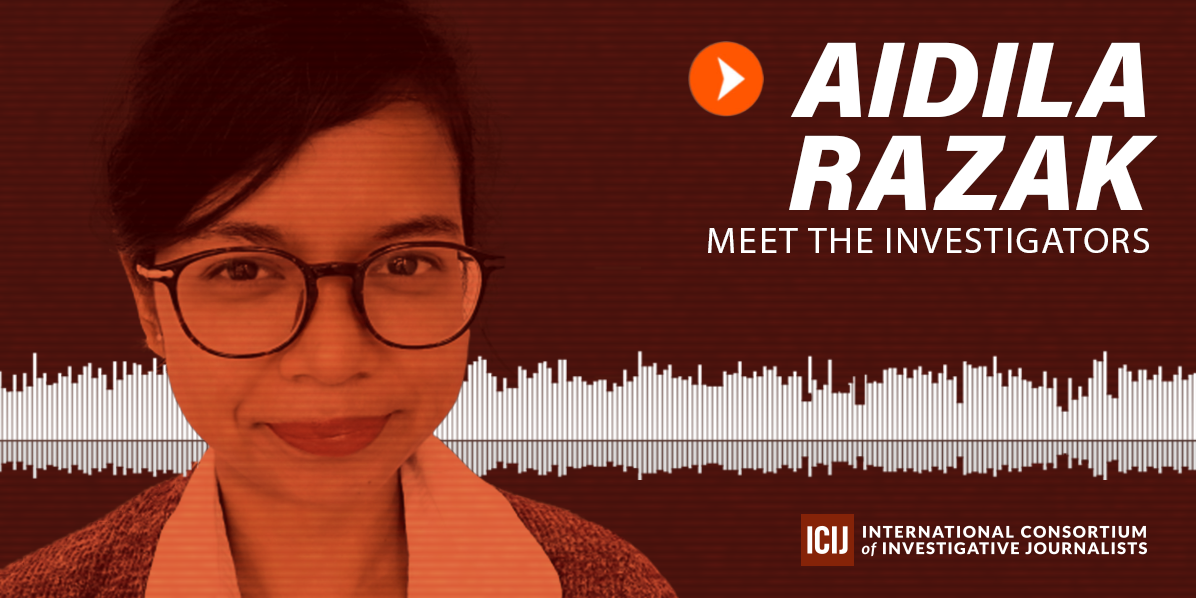Q&A
‘Bottle of Lies’ author Katherine Eban on investigating Big Pharma
The bestselling writer discusses how she followed the story of fraud in generic drug manufacturing around the world in an interview with ICIJ.

Investigative journalist Katherine Eban reports on public health and pharmaceuticals for Vanity Fair, currently covering the COVID-19 crisis. She describes her beat as being at the intersection of science and politics.
Eban’s latest book and New York Times bestseller, Bottle of Lies: The Inside Story of the Generic Drug Boom, is an investigation into the generic drug industry and exposes one of the most memorable frauds perpetrated by a giant pharmaceutical company, and the subsequent risks for patients’ health, in the U.S. and abroad.
ICIJ interviewed Eban ahead of Double Exposure, an investigative film festival, where she will run a master class on the investigative process. You can purchase tickets to the festival with a 10% discount using ICIJ’s code: ICIJDX20.
You began working on the book in 2008 and worked on it for 10 years almost uninterrupted — traveling to India, China, Ghana, England, Ireland, around the U.S. and Mexico to report. How did you get interested in that topic specifically?
So it was 2008 and I got a phone call from a guy named Joe Graedon, who is a host of an NPR program called “The People’s Pharmacy.” He said that he was getting flooded with complaints from listeners who were having trouble with their generic drugs. They weren’t working properly and [the patients] had side effects and he believed their complaints were substantial.
I kept my notes from this conversation the whole time because I felt that was consequential.
He brought those complaints to the FDA [United States Food and Drug Administration] and officials there told him that they were probably psychosomatic reactions, that you could switch to a different drug, and you have a psychosomatic reaction that’s in your head. And he didn’t believe it. And he said to me, “What is wrong with the drugs?” I was like, “Yes, what is wrong with the drugs?” And I set out to answer that question, which was so much more complicated than I could have ever dreamed up. The answer is really all over the world. So what I ended up embarking on was a global quest.
It was just a giant global connect the dots effort basically.
Your book focuses on the fraud perpetrated by the executives of Ranbaxy, the Indian drug company that makes generic Lipitor, a cholesterol treatment used by millions of patients in the U.S. In 2013 you wrote a magazine article for Fortune covering part of the case.
Why did you decide to focus on the Indian company Ranbaxy?
Once I understood that there was potential fraud in the quality of the data that generic companies were submitting to regulators, the Ranbaxy story was the obvious hook because Ranbaxy was being investigated by the FDA for data falsification.
There was a whistleblower inside of Ranbaxy, and his story forms the core of [my book] “Bottle of Lies.”
It’s an amazing story. The story of Dinesh Thakur and what he went through and his effort to expose wrongdoing of Ranbaxy was incredibly dramatic. And it took me years to piece it together, actually, from a cover up that the board of directors launched to his sort of silent suffering and secret. [His being] the biggest secret informant for the government was really very dramatic. So that and the fraud itself was incredible at Ranbaxy, I mean just beyond the stuff of nightmares. That is why I focused on that.
In 2019, Ranbaxy’s former executives, the billionaire brothers Malvinder and Shivinder Singh were found guilty of contempt of court for violating the terms of their arbitration case with Japanese company Daiichi Sankyo. How did you react to the news?
These were men who had pulled off almost the swindle of a lifetime, because they suppressed the evidence of fraud at Ranbaxy and sold it to the Japanese [company] Daiichi Sankyo for $2 billion in shares. And then once Daiichi Sankyo took over ownership of the company, they discovered, lo and behold, that they had purchased this company that was saturated with fraud, and [the Singhs] had suppressed the truth about what happened inside the company. So Daiichi Sankyo began this sort of global effort for justice for its shareholders. And that led to a series of consequences in which Malvinder and his brother were marched often in handcuffs. So it was incredibly, incredibly dramatic. And, I must say, pretty rewarding.
Talking about the whistleblower in your book, I thought his life and struggle was so sad. But it kind of tells the reality of whistleblowing, because a lot of these people really sacrifice their whole life to tell the truth.
Why did you decide to tell the story of his struggle and make him a central character?
His story, to me, was clearly the sort of necessary narrative thread by which to help the reader through what is very complicated terrain [of] good manufacturing practices, data manipulation, all this kind of stuff that is super complicated and very detailed and hard to follow.
But, here was a human story that I could really map it on to. It was remarkable. And towards the end of the book, I was reporting the story in real time.
And there [you have] Dinesh Thakur, who ended up making $48 million as a whistleblower, he could have just bought a small Caribbean island and set for it, and gone into hiding. But he ended up suing India! Talk about a fruitless quest to try to fight for better regulation and better drug quality.
Having reported a lot on whistleblowers, and having worked with many of them through my articles, [I have come to realize that] they’re a very distinct, distinct breed. Most of us can go to sleep at night, even if we know there’s a great injustice. But whistleblowers can’t, they can’t sleep at night.
And I think, as a journalist, that the people who want to do investigative journalism and want to write about this stuff and expose this stuff, also can’t sleep at night. It can be a very challenging and difficult collaboration, but you’re kind of meant for each other. So I think covering Dinesh’s quest made a lot of sense.
What was the most challenging part of all this? Was it dealing with the people or the FDA, and their bureaucracy?
Dealing with the FDA wasn’t too hard in the sense that I didn’t deal with them. They mostly didn’t talk to me and [provided] a very minimal input into this book. I would say that the most challenging part was just keeping on going until I really felt that I had answered that question.
There were many, many times where quitting seemed like the best option. The Chinese government followed me, they hacked my phone. There were some alarming circumstances in India. I felt pretty out there, by myself doing this reporting. And if this falls short of many times, sort of impossible to penetrate an industry that was headquartered 7,000 miles away from the U.S. But you get to this point in any reporting project, where you’re like, “Well, I’ve gotten this far. So if I stop now, like, what’s the point of that?” And I think through just sheer stubbornness, you keep going.
When did you decide where to stop? Because you could have kept going … forever?
Until my publisher said, “We’re going to cancel this book, unless we’ve got a draft.” Deadlines have a way of forcing you to stop. But I mean, of course, in a way you never stop. I’m reporting my book now and it was published, over a year ago. So you don’t ever really stop the reporting.
You’re still working on this?
You always follow the leads whenever they come in, even if they come in too late. On one hand, yes, but, but right now I am full time reporting on COVID-19. So I’m exploring the federal government’s response. And I’ve been doing this for big stories on what happened in the White House and Jared Kushner and those sorts of things.
You’ve been an investigative journalist for many years, what have you learned that you will apply again in the future?
You have to just talk to more people than anybody else. There’s usually a feeling of ‘how am I going to get new information when X number of journalists have been on the story?’ When it looks like all of the sources sort of belong to other people, ‘what can I possibly bring to this?’ And from that sorrow and despair usually comes some renewed effort. And then there’s usually this moment, you can almost like, smell new information. When you hear something that just sounds strange and worthy of investigation.
I think every single story I’ve done, there’s some moment like that, that launches you into reporting mode. And sometimes you have to talk to a lot of people to get to that moment. But once you have that, once you feel you’re in pursuit of new information, what’s really critical is figuring out who has information whose hands are on this information. And you have to sort of visualize and map the information like: how does it flow? Where does it sit? And who’s touched it? And who knows? And then once you do that, you really need to figure out like, who has the motivation to help you nail this story.
And in most of my stories, there are some unsung heroes who are motivated to help me get a story into print; some source somewhere, who is going to help me figure it out. So that’s critical. What’s also critical is documents, documents, almost any kind of documents. It’s like, if you’re putting up a tent, a document is one of those little pegs you put in the ground; a little stake and you’re just trying to keep this tent up. You’re sticking the stakes into the ground, whether it’s calendar entries, emails, memos, text messages.
I did a big story this summer about a COVID-19 testing plan that Jared Kushner had commissioned and then abandoned. But my reporting for that story began with this weird invoice that I got. It was an invoice for 3.5 million diagnostic tests. It was a United Arab Emirates company that sold the test kits, the client name on the invoice: just WH. That was the White House.
So that invoice sat on my desk, and I just studied it every day, trying to sort of hoover up every little piece of information from that invoice to try to figure out what it meant, where it could lead me. So you know, these documents are critical in helping you understand behind the scenes events. In that one invoice I saw a White House procurement operation that was in total violation of federal laws.
It reflected a desperate scramble behind the scenes to try to get diagnostic test kits. At a moment when President Trump had told all of us, anyone who wants to test can get a test. Well, no. They were behind the curtain, desperately trying to get test kits. So you know, the documents are critical.
So you said that basically, investigative journalists kind of become obsessed with the topic that they are working on. And it’s also a very stressful job, because you have to be sure of every little thing. So how do you relieve your stress? Do you have any special tricks?
Well, it is very stressful. There was a point when closing [the book] “Bottle of Lies” and there were a lot of legal threats that you get to a moment in a project where, even your best sources hate you, too.
At that point, I was like, ‘Can I do this work anymore? This is so incredibly stressful.’ And then you get past that and of course, you’re really committed to the whole thing.
A great stress reliever: I have a giant dog named Romeo who’s a 187 pound Newfoundland. He’s huge. And we have a lot of fun with him. My kids and husband are great support. And that’s pretty much it. But this is a very high stress moment. Now, for journalists covering the upcoming election, covering the pandemic. Journalists are under so much pressure. It is hard to find a stress relief.
So you’re covering COVID-19 now, and a lot of other people are doing that too. Despite the whole coverage, do you think there is still something that is going underreported?
I would say all of my stories kind of fall under this politics versus science conflict, which is really at the heart of our terrible COVID-19 response in the U.S. We’re seeing sort of governmental lies on an epic scale. And journalists have to be out there exposing [them]. It is literally a matter of life and death. It’s like an all hands on deck moment. It’s not like, there’s just one lie. There is a whole landscape of lies.
So to be able to kind of dismantle that through reporting and to come back to the science and to explain all this to readers … there needs to be a whole army of us doing it.
Did your interests and skills as a novelist inform your work as a journalist?
I think that they do because storytelling is critically important. Without storytelling, you don’t have readers. When constructing these stories, the reader has to be sort of front of mind. And that can often be very hard to do with investigative journalism because there’s huge amounts of material, it’s hard to condense.
So when I talk to my editors and construct the lead to a story, we talk about the camera. My editor at Vanity Fair sometimes says, “Okay, this is the camera opening up on the film, and how do you get the reader into the story?” So do think a lot about scenes and all of that.
Finally, one question that we always ask: do you have any tips for aspiring investigative journalists?
Work harder than anybody else. That is the name of the game. There are people who make three phone calls; be the journalist that makes 10 phone calls.
Don’t get discouraged and don’t necessarily take no for an answer. Aggressively but politely pursue information and pursue sources. Unless somebody tells you that if you contact them again, they’ll call the police, there is the potential for a relationship there.
And then once they invoke the police, then you really can’t go back to them. But short of that, don’t give up!
With people who are not answering my emails, or my texts, one thing that I’ve done in my reporting is … I just continue sending them every couple of days. I pretend that we’re actually in a relationship. And then eventually, they’ll respond. And offer your sources information. The journalist is always asking for information … offer them information. It’s an amazing door opener, because people in these governmental bureaucracies want information. There’s often information they don’t have and don’t know. If you’re somebody who’s like, “Hey, I wanted to share something with you.” I mean, who doesn’t respond to that?
The interview has been edited for clarity.


